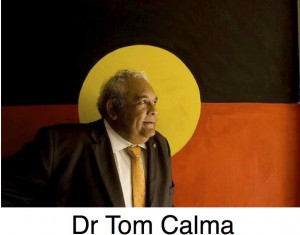Today, during NAIDOC Week, Passive Complicity brings an interview with Dr Tom Calma by the ABC’s Margaret Throsby. The link to the podcast is below the bio.
 Dr Calma is an Aboriginal elder from the Kungarakan tribal group and a member of the Iwaidja tribal group whose traditional lands are south west of Darwin and on the Coburg Peninsula in the Northern Territory of Australia, respectively. He has been involved in Indigenous affairs at a local, community, state, national and international level and worked in the public sector for 40 years and is currently on a number of boards and committees focussing on rural and remote Australia, health, education and economic development.
Dr Calma is an Aboriginal elder from the Kungarakan tribal group and a member of the Iwaidja tribal group whose traditional lands are south west of Darwin and on the Coburg Peninsula in the Northern Territory of Australia, respectively. He has been involved in Indigenous affairs at a local, community, state, national and international level and worked in the public sector for 40 years and is currently on a number of boards and committees focussing on rural and remote Australia, health, education and economic development.
In January 2104 he was appointed Chancellor of the University of Canberra and the first Indigenous male Chancellor of an Australian university.
Dr Calma was appointed National Coordinator, Tackling Indigenous Smoking in March 2010 to lead the fight against tobacco use in Aboriginal and Torres Strait Islander communities. Dr Calma’s most recent previous position was that of Aboriginal and Torres Strait Islander Social Justice Commissioner at the Australian Human Rights Commission from 2004 to 2010. He also served as Race Discrimination Commissioner from 2004 until 2009. Dr Calma has spearheaded initiatives including the Close the Gap for Indigenous Health Equality Campaign, the National Congress of Australia’s First Peoples, development of the inaugural Indigenous suicide prevention strategy and Justice Reinvestment.
He was awarded an Order of Australia in 2012 for distinguished service to the Indigenous community as an advocate for human rights and social justice, through contributions to government policy and reform, and to cross cultural understanding.In 2010, Dr Calma was awarded an honorary doctor of letters from Charles Darwin University. In May 2014 Dr Calma was awarded an honorary doctor of the university from Flinders University in recognition of his work, advocacy and leadership in Indigenous health reform. And in 2011, Dr Calma was awarded an honorary doctor of science from Curtin University in recognition of his work, advocacy and leadership in Indigenous health reform and Indigenous affairs.
This interview was first broadcast May 29 2014.
